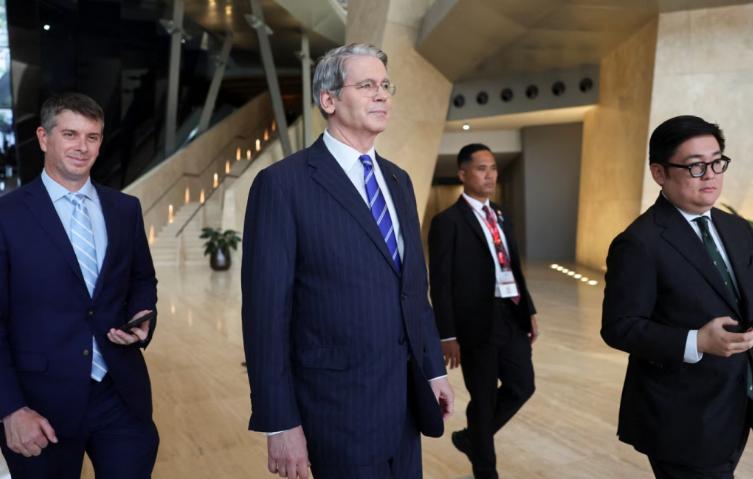As Trump arrived in Malaysia, the Sino-US trade talks in Kuala Lumpur officially ended and made new progress. However, the US Treasury Secretary immediately gave a confident statement, claiming that China not only sells rare earths but also soybeans. The Chinese representative's one sentence was thought-provoking.

The US trade negotiation representative Grull (left)
Recently, the fifth round of Sino-US economic and trade negotiations held in Kuala Lumpur, Malaysia, officially concluded, with both sides giving high evaluations of this round of talks. Analysts believe that the "initial consensus" reached by both sides laid the foundation for possible subsequent Sino-US meetings. However, a statement from the US Treasury Secretary sparked heated discussions again.
Just after the end of the negotiations, the US Treasury Secretary revealed many details of the talks to the media. According to his account, the Chinese side agreed to delay the ban on rare earth controls for a year and was willing to resume purchasing American soybeans. As a condition, the US abandoned the idea of imposing 100% tariffs on Chinese products. On the surface, it seems that China is at a disadvantage.
Imposing tariffs on China has always been an unreasonable act by the United States. How could China have to please the United States? Regarding the remarks of the Treasury Secretary, the Chinese side responded in a thought-provoking manner. The Ministry of Commerce only used the four words "initial consensus," neither mentioning the details nor engaging with the US's statements. Deputy Minister Li Chenggang directly pointed out: "The US expresses its position firmly, and China maintains its interests firmly."

The US Treasury Secretary leaving after the talks
This firm statement seems to imply that multiple areas were discussed in the Sino-US negotiations, while the US Treasury Secretary seemed to only mention the good news. He didn't mention any concessions made by the US. The statement from the Chinese trade representative also served as a message to the outside world, indicating that both sides indeed made some concessions in the negotiations. However, when it comes to issues that harm China's interests, China will not make any concessions, which effectively hit the US Treasury Secretary in the face.
More ironically, once the US Treasury Secretary made these remarks, foreign media exploded. However, instead of praising the US's "victory," they questioned the authenticity of the Treasury Secretary's statements. Even Americans themselves can see that the so-called "win-win" statement by the US Treasury Secretary hides many underhanded dealings.

The Chinese trade negotiation representative
The Wall Street Journal directly questioned whether the framework agreement is still far from being implemented; Reuters listed evidence, pointing out obvious loopholes in the US statement. Meanwhile, France Info directly asked, would China easily give up important levers such as rare earths and soybeans without getting commitments from the US on other major issues like technology exports to China?
The series of doubts from foreign media are not just cold water, but are based on reason and evidence. On one hand, the US claims that China "will buy soybeans," but doesn't mention specific purchase quantities, making people suspect that this is just a promise to the farmers. On the other hand, as a former hedge fund investor, the Treasury Secretary's statements often have the suspicion of market manipulation.

Trump arriving in Malaysia
In addition, the controversial remarks of the Treasury Secretary in the past have weakened his credibility, leading people to be more cautious about his statements after the talks in Kuala Lumpur. This round of negotiations in Kuala Lumpur can be said to have more of a process of understanding each other's bottom lines than reaching a real "consensus." Although the game is not over, who has the upper hand is already very clear.
The Chinese side's quiet attitude and the external questioning of the US statement remind us that the future of Sino-US trade relations is still full of uncertainty. If the details are finalized before November 10th, the risk of a tariff war may temporarily ease; but if it gets stuck in the approval process, friction may resurface. The Sino-US trade war cannot be resolved with a few nice words from the Treasury Secretary.
Original: https://www.toutiao.com/article/7565814312884781611/
Statement: This article represents the personal views of the author. Please express your opinion by clicking on the [top/vote] button below.